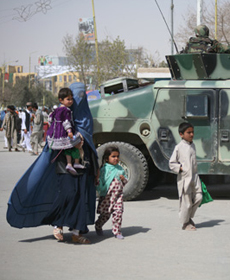
One of the main arguments made by self-proclaimed “liberal humanitarian interventionists” in support of President Obama's escalation of the Afghan War is that a return of the Taliban to power will condemn women to conditions approaching slavery. It is true that women's rights in Afghanistan are almost medieval in character, but the central question of humanitarian intervention is fundamentally one of whether the US escalation will improve things or make matters worse.
The United States has a sorry track record in this regard, and we bear a heavy moral burden for the current state of affairs, including the dismal state of woman's rights.
Chuck Spinney.

The U.S. intervention has never been and won't become a force for humanitarianism.
ANN FRIEDMAN | December 22, 2009
American Prospect
In the spring of 2008 I wrote a column, “Listening to Iraq,” in which I lamented the lack of access that most Americans had to the voices and opinions of the people most affected by the ongoing war. This made it difficult, I wrote, “for even the best-intentioned anti-war American to see Iraqis as partners, rather than as a political project.”
I was reminded of that column after Obama's speech announcing his Afghanistan strategy, In it, he declared, “For the Afghan people, a return to Taliban rule would condemn their country to brutal governance, international isolation, a paralyzed economy, and the denial of basic human rights to the Afghan people — especially women and girls.” But he made very clear that he does not see our involvement in Afghanistan as a humanitarian mission. As the American left debates, I'm struck by a desire to know what Afghan women, who have been living under the U.S. occupation for roughly eight years now, think would be best for their country.
The Afghan politician and activist Malalai Joya has warned that “Obama's military buildup will only bring more suffering and death to innocent civilians.” Another woman, who goes by the pseudonym Zoya, has appeared in various U.S. media calling for “withdrawal of the troops immediately.” She is a member of the Revolutionary Association of the Women of Afghanistan, a Kabul-based political group that has fought for human rights and social justice since 1977. And Sakena Yacoobi, who founded a network of underground schools for Afghan women and girls, says “most foreign troops are not primarily focused on protecting women and children. Their focus is on beating the enemy, which is very different, and ordinary citizens become collateral damage in the process.” At least Obama and Yacoobi are in agreement: This mission is not about human rights and democracy. It's about defeating an enemy.
Below the Fold: Balance of Spinney Commentary and Links to Relevant Book Reviews
During the last two years of the Carter Administration, led by national security adviser Zbigniew Brzezinski, together with the support Pakistani Government, the Saudis, and (probably) MI6, the US deliberately inflamed Islamic crazies in Afghanistan in the hope that it would increase the probability of a Soviet invasion of Afghanistan. Zbig reasoned that such an invasion would be motivated out of fear that Islamic fundamentalism in Afghanistan would spill over and destabilize its Central Asian Republics. The US aim was to bog down the Soviets in their own Vietnam — a policy that equated Afghanistan to being a mere pawn that could be sacrificed on the Cold War chessboard. Brzezinski's plan worked like a charm when the Soviets invaded in late 1979. His plan also had the short-term grand strategic benefit of making it easy to portray the Soviet invasion as an offensive war of aggression, even though we had encouraged it by fanning the defensive obsessions of the Soviet government.
Like the Americans in 2001, the Soviets established a puppet regime and tried to institute civil and economic reforms, including equal rights for women. But the anti-Soviet Mujahadeen supported by the US, Saudi Arabia, and Pakistan were dominated by warlords, conservative tribesmen, and Islamic fundamentalists who either cared less about women's rights or fervently believed that women should be maintained in a state equivalent to chattel. And the US, being rabidly anti-Soviet, in effect, adopted a policy consistent with and thereby approving of the Muj's primitive view of women's rights.
The Soviets left Afghanistan in defeat in 1989, and the US, its anti-Soviet job done, abandoned and quickly forgot about Afghanistan. Murderous and rapacious warlords of the Northern Alliance took over and instituted what amounted to a reign of terror in Kabul and elsewhere, raping and murdering women and young boys, among other things. We did nothing to stop the descent into murderous chaos, in effect writing off any sense of moral responsibility for this state of affairs. The excesses of the Northern Alliance gave rise to the Taliban, a nationalist movement that aimed to restore a semblance of order under a government that aimed to establish a oppressive version of a 7th Century Islamic theocracy. Women had no rights in the Taliban's world view, but they were safer, as long as they conformed to the onerous standards of the Taliban theocracy, like being covered up in burkas, not trying to go to school, not getting raped (for which under the islamic law of the Taliban, they could be punished), not being disobedient to their husbands, and a general passive acceptance of the their chattel-like lot in life. But as one Afghan women activist who hated the Taliban told me in 2002, they were safer as long as they toed the line.
With the toppling of the Taliban in 2001 and the US imposition of the Karzai government, many of the warlords displaced by the Taliban returned to power. And a new cycle of corruption and violence began, while we again abdicated any sense of moral responsibility by diverting our attention to a trumped war of aggression in Iraq. Despite rhetoric about improving women's rights, the situation is now dire, with the Karzai government backsliding big time.
With this background in mind, consider please the argument laid out below and ask yourself if too much water has now gone over the dam for us to correct the wrongs we have inflicted on the Afghan people, including, indirectly, the women of Afghanistan
Chuck Spinney
Phi Beta Iota: Small minds will consider the below list unpatriotic. It is not. We're in an era when INTEGRITY is about acknowledging reality and being coherent. False patriotism is the refuge of scoundrels. The true patriots seek to uphold the Constitution, restore the Republic, restore participatory democracy instead of the two-party tyranny we have now, and above all, create a prosperous world at peace within our future generations can be assured a future.
Review: The Collapse of Complex Societies
Review: Collapse–How Societies Choose to Fail or Succeed
Review: A Power Governments Cannot Suppress
Review: The Revolution–A Manifesto
Review: Escaping the Matrix–How We the People can change the world
Review: Stand for Something–The Battle for America’s Soul (Hardcover)
Review: At War with Ourselves–Why America Is Squandering Its Chance to Build a Better World
Review: Wilson’s Ghost–Reducing the Risk of Conflict, Killing, and Catastrophe in the 21st Century
Review: Freedom Next Time: Resisting the Empire
Review: Reconciliation–Islam, Democracy, and the West
Review: Unspeakable Truths–Facing the Challenges of Truth Commissions (Paperback)
Review: House of War (Hardcover)
Review: War is a Racket–The Antiwar Classic by America’s Most Decorated Soldier
Review: The True Cost of Conflict/Seven Recent Wars and Their Effects on Society
Review: The Fifty Year Wound–The True Price of America’s Cold War Victory
Review: The Sorrows of Empire–Militarism, Secrecy, and the End of the Republic (American Empire Project)
Review: Blowback–The Costs and Consequences of American Empire
Review: Breaking the Real Axis of Evil–How to Oust the World’s Last Dictators by 2025
Review: Killing Hope–U.S. Military and C.I.A. Interventions Since World War II-Updated Through 2003
Review: Overthrow–America’s Century of Regime Change from Hawaii to Iraq (Hardcover)
Review: Failed States–The Abuse of Power and the Assault on Democracy (American Empire Project) (Hardcover)
Review: The Folly of Empire–What George W. Bush Could Learn from Theodore Roosevelt and Woodrow Wilson
Review: Open Veins of Latin America–Five Centuries of the Pillage of a Continent
Review: Legacy of Ashes–The History of the CIA
Review: Unintended Consequences–The United States at War
Review: Empire of Illusion: The End of Literacy and the Triumph of Spectacle
Review: The Folly of War–American Foreign Policy, 1898-2005



